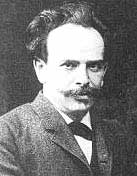 |
FunctionalismWithin anthropology, there were several reactions to the ethnocentrism and loose science implicit in cultural evolutionism. In the United States, anthropologist Franz Boas emerged as a strong critic of cultural evolutionism. He noted that the grand cultural stages of progress set up by the evolutionists had no evidence to support them. According to Boas each culture could only be understood within the context of its own specific history. There were no "higher" or "lower" forms of culture, said Boas, and cultures could not be compared in that fashion. His approach came to be know as historical particularism. One of the main components of historical particularism was clearly the concept of cultural relativism, a major contribution of Boas to cultural understanding. Boas is often said to have started cultural anthropology in the United States and made many significant contributions to the discipline. Click here (recommended) for a brief article on Boas.
Franz Boas (1858-1942) I certainly agree with Boas that a detailed knowledge of the culture's history will help the outsider understand why the culture is the way it is. In fact, in many of the cultures we look at this semester, we do first look at how they were in the past before looking at the present. (Fadiman also does this in her book on the Hmong, as you will see.) However, I will spend more time with another theoretical approach, functionalism. Functionalism seems to me to be the easiest way to try to gain an etic understanding of a cultural trait. It is a useful way to view culture, but like all approaches has its limitations. What follows is a brief, and limited, discussion of functionalism, or as it is sometimes called, structural functionalism. Functionalism is identified with two British anthropologists, Bronislaw Malinowski (already discussed for his contributions to participant observation and the emic understanding of a culture) and Alfred Radcliffe-Brown. Both men stressed that the task of the anthropologist was to explain the current functions of cultural traits, rather than attempting to explain the origins of cultural differences. Functionalism (unlike the diachronic approach of cultural evolutionism, historical particularism,and the soon to be discussed cultural materialism) took a synchronic approach to a culture:it looked at a culture at a given instant in time. Once the functions of all the cultural institutions and behaviors had been explained, nothing more could be said about the culture. Major Assumptions of Functionalism
Radcliffe-Brown emphasized that a culture is like the human body, composed of many parts, each with a task to do in order to maintain the entire body. Since all parts are interrelated, a "malfunction" of one part would likely affect all the other parts, and the health of the whole system. The anthropologists job was to identify what the cultural trait did to maintain the entire system; similarities between cultures (such as the presence of marriage institutions) could be explained by looking at what marriage always does, what its function is, in maintaining the entire culture. A person who did not understand how cultural parts were interrelated in a system might come into a culture determined to change plural marriages to monogamy. Since all parts of the culture are interrelated, such a person might change many aspects of a culture, or even cause its complete destruction. Problems of Functionalism
Doing Functional AnalysisThe fact remains that doing a functional analysis of a specific trait helps avoid an ethnocentric perspective, necessitates an emic perspective, and helps in obtaining an etic perspective. The next lesson presents a functionalist analysis of witchcraft among the Tiv, as they were described in the 1950's by Laura Bohannan in the excerpt from Return to Laughter (already assigned). Witchcraft in anthropology refers to the belief that humans are capable of influencing the supernatural world to harm other people. Magic in general means the belief that humans can use the supernatural world to influence events; if that influence is negative or harmful to people, the appropriate anthropological term is sorcery or witchcraft. The two chapters you have read on the Tiv provide considerable information of their beliefs about witchcraft--the emic perspective, or the form of witchcraft, as functionalists would say. It also provides information on the function--or etic explanation-- of witchcraft. The next lesson explores this topic in much more detail. |
